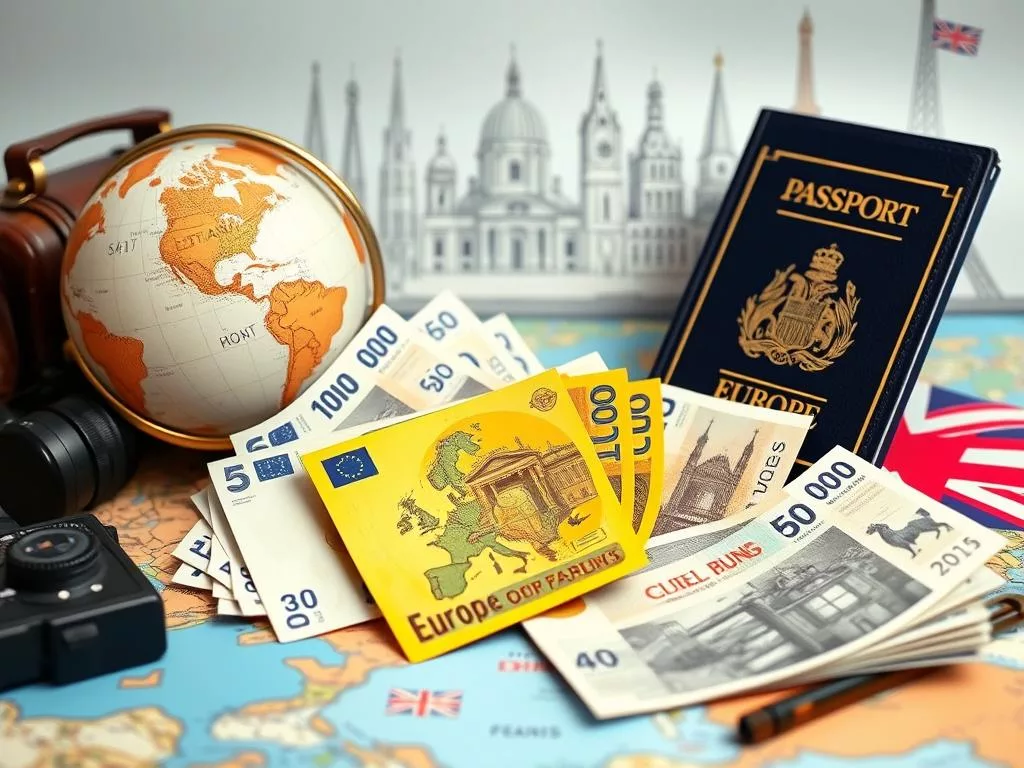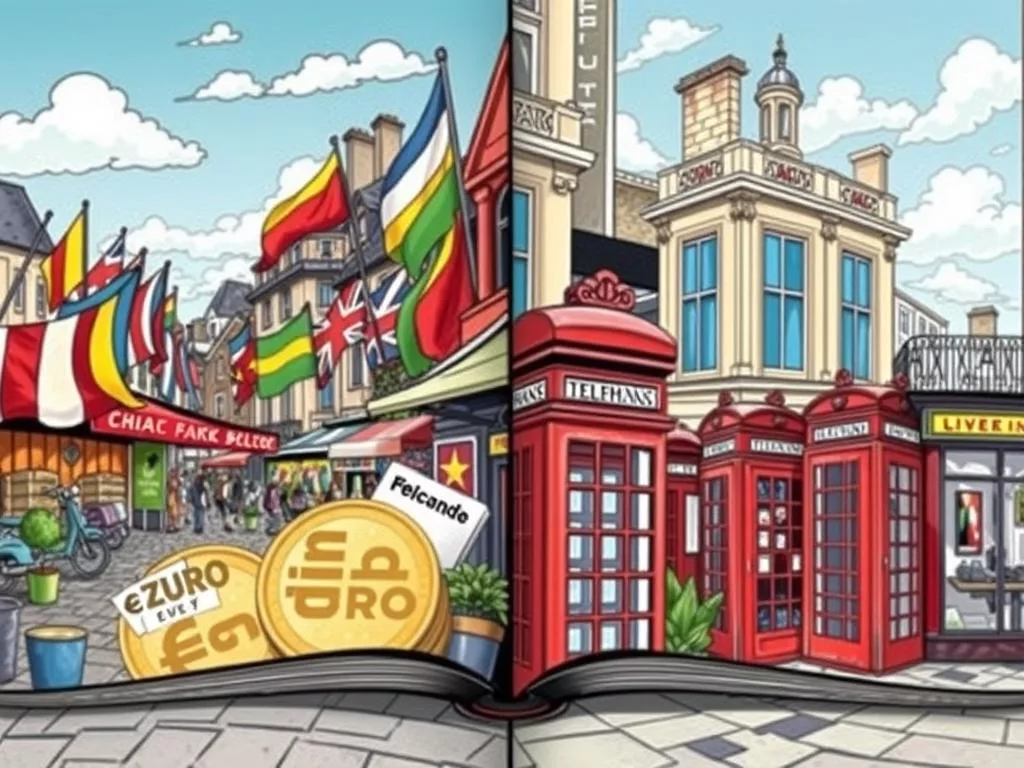When you travel internationally, knowing your currency choice is key to saving money. You might wonder if you should pay in euros or pounds. This choice can save you money or cost you more, depending on fees and exchange rates.
Paying with a card abroad usually means a 2.65% fee for non-sterling transactions. But, paying in euros can save you this fee. Travelers with a Travel account can even avoid these fees on euro purchases and ATM withdrawals up to €200 every 30 days. Just remember, local ATM fees might apply.
For the best exchange rates, always choose local currency at ATMs. Letting the ATM convert your money to pounds can cost you more than 10% per transaction. This can make your trip more expensive.
Using a prepaid currency card or a credit card with no foreign transaction fees can save you a lot. For example, Starling Bank lets you spend abroad without fees. Revolut is another good option, even with some limits.
This article will help you make smart money choices while traveling. Whether you choose euros or pounds, you’ll have a great and affordable trip.
Understanding Currency Options While Traveling
Choosing the right currency options while traveling can greatly affect your budget. People often use cash, ATMs, or credit and debit cards for spending. It’s key to know that picking between local and home currency can change your costs.
Paying in local currency usually saves money, thanks to cards with no foreign fees. Credit cards made for international use can help avoid extra charges.
Don’t forget about credit card fees that can add up. Fees for foreign transactions are usually 2% to 3%. Using dynamic currency conversion (DCC) can double these costs, leading to unexpected fees.
Choosing DCC for home currency can increase fees by up to 6%. For example, a $1,000 expense could mean paying about $60 extra. These fees can quickly add up, costing hundreds or thousands of dollars more.

Smartphone apps for currency conversion can also help. They give real-time rates and keep you updated on costs and fees abroad. Look into prepaid cards or travel credit cards without extra fees for better savings.
ATM fees can also increase your costs. It’s important to know these fees when getting cash.
For smart travelers, picking the right payment method is key. Retailers might offer to convert to pounds, but this often has worse rates than using your card. Being informed and choosing wisely can make your trip cheaper and easier. For more tips on saving during currency conversion, check this essential guide.
Guide to should i pay in euros or pounds
Traveling in Europe can lead to financial choices, like whether to use euros or pounds. The euro is used in 20 countries, while pounds are for the UK. Knowing when to use each can affect your travel budget.
Paying in euros is often cheaper. It avoids the high fees of dynamic currency conversion. Paying in pounds might seem easy, but it can lead to extra fees and bad exchange rates.
International transactions can have bank fees. These fees can add up, making your trip more expensive. Be careful with ATM withdrawals, as they can cost you more. Using a multi-currency account can help save money on exchange rates.
Here’s a table to help you decide between euros and pounds:
| Payment Method | Benefits | Drawbacks |
|---|---|---|
| Pay in Euros |
|
|
| Pay in Pounds |
|
|

Making smart choices when you buy can save you money on a long trip. Always try to pay in euros to avoid extra fees and bad exchange rates.
Choosing the Right Payment Method Abroad
When planning your trip, picking the right payment methods is key. Credit cards abroad often give the best exchange rates, without foreign transaction fees. Travel debit cards, like the First Direct debit card and the Chase debit card, are great. They let you spend and withdraw cash without extra charges.
Travelers should look at their options carefully. Some travel credit cards, like the Barclaycard Rewards Visa and the Halifax Clarity Mastercard, don’t charge for spending or withdrawals abroad. These cards also offer cashback and rewards. The Wise card is another good choice, allowing transactions in over 150 countries without markup on exchange rates. It has a small currency conversion fee and lets you withdraw up to £200 in fee-free cash each month.
It’s important to know the downsides of some payment methods. Cash advances on credit cards can have high-interest rates and fees. For ATM withdrawals, use machines from your bank to get the best rates and avoid fees.
| Card Type | Foreign Transaction Fees | ATM Withdrawal Fees | Additional Benefits |
|---|---|---|---|
| First Direct Debit Card | No Fees | No Fees | £500/day limit |
| Chase Debit Card | No Fees | No Fees | £500/day limit |
| Barclaycard Rewards Visa | No Fees | No Fees | Cashback |
| Halifax Clarity Mastercard | No Fees | No Fees | Travel rewards |
| Wise Card | Small Currency Conversion Fee | Fee-free up to £200/month | No Markup on Exchange Rates |
While traveling, watch out for ATM operator fees and bad exchange rates. Paying in local currency usually gives a better rate. Avoiding airport currency exchanges can also save you money, as they can charge up to 17% more than IMF rates.
By understanding the financial landscape and choosing your payment methods wisely, you can have a smoother and more cost-effective trip.
Smart Currency Exchange Tips
When you’re getting ready for international travel in 2025, think about using smart currency exchange tips. Start by exchanging your money at your local bank or credit union before you leave. They usually give you the best rates compared to airport kiosks or exchange houses. It’s important to avoid fees, so ask about any charges for foreign currency exchange.
While you’re away, use ATMs affiliated with your bank for cash. This is a good idea in places like Italy, where cash is more common. Before you withdraw, check the local exchange rates to avoid bad conversions. Remember, using independent ATMs, like EURONET, can cost a lot and affect your budget.
Also, be careful about converting payments back into US Dollars at point-of-sale terminals. This service can have hidden costs. To learn more about smart currency exchange, check out guides on getting cash abroad. Knowing these tips can make your travel better and help you with future trips.

